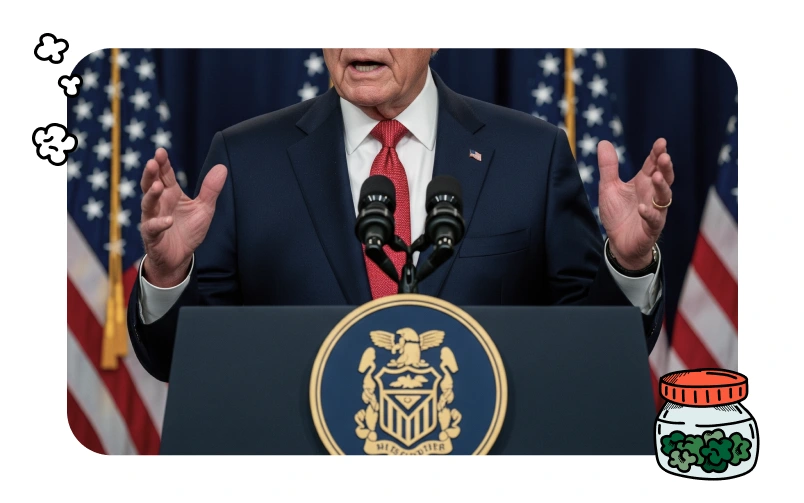Cannabis Rescheduling Back on the Table: 2025 Update


Just when it seemed that any further consideration of rescheduling cannabis had completely stalled, there seems to finally be some movement. This past month, cannabis rescheduling vaulted back into the national spotlight when President Trump confirmed active consideration of a federal decision to reclassify cannabis from Schedule I to Schedule III.
What Would Rescheduling Mean for the Cannabis Industry?
On August 11, 2025, President Trump announced to the media that his administration was evaluating whether cannabis should move to a lower risk category under federal law. This would mean reevaluating the DEA’s existing recommendation to downgrade it to Schedule III, a classification used for drugs with moderate to minimal risk of adverse health effects. Trump indicated that a decision would come “over the next few weeks.”
This change could bring major relief to the cannabis industry by opening the door to banking services, institutional investment, standard tax deductions, and merger opportunities. Right now, cannabis businesses are restricted by Section 280E of the federal tax code, which bars companies from claiming deductions or credits if they are involved with Schedule I or II controlled substances. Because cannabis is still a Schedule I drug, businesses face inflated tax burdens and limited financial options. Section 280E has also discouraged most banks from working with the industry, leaving many companies to operate primarily in cash.
Why Rescheduling Has Stalled
The road to rescheduling has been proactive — but slow. Starting in October 2022, the Biden administration directed HHS and the DEA to assess cannabis. By August 2023, HHS recommended rescheduling to Schedule III based on evolving scientific standards. DEA followed with a proposed rule in May 2024. A hearing was scheduled for January 2025 but was postponed amid procedural appeals.
Moreover, the newly confirmed DEA Administrator, Terrance Cole, recently omitted cannabis rescheduling from his strategic priorities — despite having previously stated it would be a top focus. This raised concern among reform advocates about internal backtracking within the DEA. Currently, the process remains in limbo, caught between bureaucratic delays and political pressure.

Rescheduling vs Descheduling
Though rescheduling is more likely than descheduling, both have support from different political factions and industry groups.
Rescheduling to Schedule III:
- Medical acknowledgment: This would mark the first time federal law recognizes cannabis as having medical value with lower abuse potential.
- Research expansion: The transition could ease licensing hurdles, enabling more clinical studies and drug development.
- Financial relief for businesses: Companies could claim standard deductions, bypass Section 280E, and improve banking access and investor appeal.
- Criminal penalties: While still federally illegal, penalties for cultivation, sale, and possession could soften.
Full Descheduling:
- Decriminalization and expungement: This approach aims to eliminate federal cannabis prohibitions and address social justice legacies.
- State autonomy: States would regain regulatory authority without federal override, potentially fostering diverse legal markets.
- Comprehensive reform: Descheduling would streamline research, commerce, and equity — but requires robust legislative consensus.

Support for Cannabis Rescheduling
Marijuana 1-to-3 Act
Rep. Greg Steube (R-FL) has pledged to reintroduce the Marijuana 1-to-3 Act, which would legislatively mandate the rescheduling of cannabis to Schedule III within 60 days of enactment. This move offers a path to bypass potential legal delays tied to agency review and judicial appeals.
State Level Support
The Republican governor of Indiana noted that a federal rescheduling could inject new momentum into his state’s legalization efforts, calling it adding “a little bit of fire” to local reform.
Industry Reactions
Investor optimism briefly surged, pushing cannabis stocks upward, only to be dampened by rising skepticism. For example, Tilray’s stock dropped 5.7% following renewed doubts about imminent reform. Such volatility underscores the sector's sensitivity to policy shifts and the underlying fragility fueled by regulatory uncertainty.
Public Opinion
Trump ally and political strategist Roger Stone penned an op-ed arguing that rescheduling is not the endpoint, but a critical next step toward full descheduling and legalization. He emphasized that rescheduling could unlock “immediate, measurable relief for patients, entrepreneurs and state programs.”
What the Critics Are Saying
Despite potential benefits, critics warn of health risks tied to a loosening of federal control. One editorial cautioned that reducing cannabis to Schedule III could downplay associated dangers — including links to heart issues and schizophrenia — especially among younger users. The piece advocated for retaining the stricter Schedule I classification until the science is more definitive.
GOP Lawmakers Fight Rescheduling
On August 28, a group of nine Republican House members, backed by Smart Approaches to Marijuana (SAM), formally urged Attorney General Pam Bondi — and by extension, President Trump — to reject the Biden-era proposal to reclassify cannabis. They argued that rescheduling would signal that marijuana is harmless and reward "big marijuana and foreign drug cartels" with billions in federal tax breaks.
Adding to the institutional opposition, the House Appropriations Subcommittee approved a provision that would bar the Department of Justice from using funds to reschedule or deschedule cannabis, effectively tying the DOJ’s hands unless Congress lifts the restriction.
These efforts underscore how cannabis policy has become a flashpoint in cultural and political debates, with some lawmakers reframing rescheduling as a moral issue rather than solely a regulatory one.
Democrats Introduce the MORE Act
On August 29, Rep. Jerrold Nadler (D-NY) reintroduced the Marijuana Opportunity, Reinvestment and Expungement (MORE) Act, aiming to fully deschedule cannabis rather than simply reclassifying it. The bill includes provisions for decriminalization, expungement of convictions, and equity-driven reinvestment programs.
This development signals a growing divide: descheduling through legislation versus administrative rescheduling via the DEA and DOJ. While rescheduling could ease burdens, full descheduling would fully reshape federal cannabis policy.

Next Steps
Whether legislation forges ahead to reschedule or deschedule cannabis, there is still a long road ahead filled with potential pitfalls, as well as successes, for the industry.
Legal Perils
Bloomberg Law warns that Trump’s rescheduling plan may invite legal challenges, especially if seen as overstepping executive authority.
Debt Pressures
The cannabis industry remains fraught with financial pressure, with up to $3 billion in debt maturing by the end of 2026, a wave that could disrupt operations and heighten industry urgency.
State-Level Reform
Independently, states are advancing reform. For instance, Pennsylvania’s governor proposed legalization, projecting over $500 million in revenue for Medicaid, transit, and education.
Conclusion
As President Trump’s decision deadline looms, the cannabis rescheduling debate remains highly fluid. Rescheduling to Schedule III could offer immediate tangible benefits, while legislative descheduling could enact broader societal reforms — but achieving either will require navigating a complex landscape of political, legal, and financial challenges. Whether through the executive branch or Congress, the path forward promises to shape the next chapter of U.S. cannabis policy.


